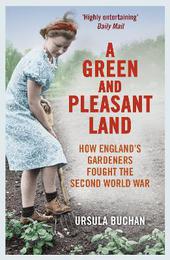
|
A Green and Pleasant Land: How England's Gardeners Fought the Second World War
Paperback / softback
Main Details
| Title |
A Green and Pleasant Land: How England's Gardeners Fought the Second World War
|
| Authors and Contributors |
By (author) Ursula Buchan
|
| Physical Properties |
| Format:Paperback / softback | | Pages:384 | | Dimensions(mm): Height 198,Width 129 |
|
| Category/Genre | British and Irish History
Second world war
Gardening
Nostalgia - general |
|---|
| ISBN/Barcode |
9780099558668
|
| Classifications | Dewey:940.5341 |
|---|
| Audience | |
|---|
|
Publishing Details |
| Publisher |
Cornerstone
|
| Imprint |
Windmill Books
|
| Publication Date |
27 March 2014 |
| Publication Country |
United Kingdom
|
Description
'War is the normal occupation of man - war and gardening' Winston Churchill SHORTLISTED FOR INSPIRATIONAL BOOK OF THE YEAR AT THE 2014 GARDEN MEDIA GUILD AWARDS. The wonderfully evocative story of how Britain's World War Two gardeners - with great ingenuity, invincible good humour and extraordinary fortitude - dug for victory on home turf. A Green and Pleasant Land tells the intriguing and inspiring story of how Britain's wartime government encouraged and cajoled its citizens to grow their own fruit and vegetables. As the Second World War began in earnest and a whole nation listened to wireless broadcasts, dug holes for Anderson shelters, counted their coupons and made do and mended, so too were they instructed to 'Dig for Victory'. Ordinary people, as well as gardening experts, rose to the challenge- gardens, scrubland, allotments and even public parks were soon helping to feed a nation deprived of fresh produce. As Ursula Buchan reveals, this practical contribution to the Home Front was tackled with thrifty ingenuity, grumbling humour and extraordinary fortitude. The simple act of turning over soil and tending new plants became important psychologically for a population under constant threat of bombing and even invasion. Gardening reminded people that their country and its more innocent and insular pursuits were worth fighting for. Gardening in wartime Britain was a part of the fight for freedom.
Author Biography
Ursula Buchan studied modern history at Cambridge University, before training as a horticulturist at the RHS Gardens, Wisley and the Royal Botanic Gardens, Kew. She wrote a gardening column for a succession of national newspapers, including the Observer, Sunday Telegraph and Daily Telegraph, as well as The Spectator, for more than twenty-five years. Shehas published fifteen books and won two major writing awards from the Garden Media Guild. She was recently awarded the Garden Media Guild's Gardening Columnist of the Year 2011.
ReviewsInformative and highly entertaining * Daily Mail * Meticulously researched, gripping and often humorous -- Leslie Geddes Brown * Country Life * Elegantly written and rich with horticultural vignettes * Spectator * Buchan's book provides an intriguing glimpse of horticultural life in war conditions . . . [An] excellent book, both touching and informative on a historical level. * Lady * A compelling account ... It also unearths some unexpected facts - such as the liberal use of cyanide as a pesticide. * House & Garden * Thoroughly researched, insightful and comprehensive... This book is a rattling good read that reveals a new and broad perspective on one of the most intriguing aspects of British garden and wartime history. -- Toby Musgrove * The Garden * This fascinating book is rather like an extremely rich fruit cake, densely packed with all sorts of ingredients. It's tempting to pick through it and extract your favourite bits, but eventually you realise that eating the entire thing is actually more satisfying... An immensely rewarding read. * BBC Countryfile * A narrative that is always engaging, sometimes astonishing, by turns hilarious, outrageous and deeply moving. * Hortus magazine * A well-researched and evocative account of how Britain's gardeners fought the Second World War. * The Countryman * [An] engaging history... All sorts of people found solace in creating small regions of abundance and fertility, a counter to the annihilating wastefulness of war. -- Olivia Laing * Observer *
|